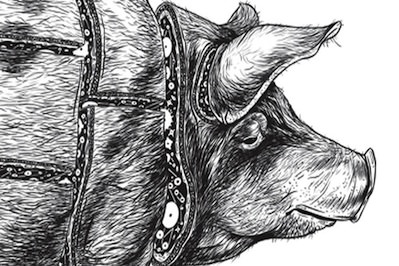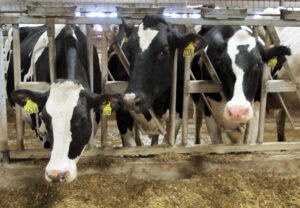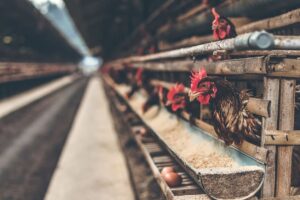The Chain
A new expose of Big Pig reveals that for all the hoopla about artisanal bacon and grass fed beef, Spam and its industrial meat cousins are still what's for dinner. Image by Harper
Image by Harper
Image by Harper
|
To see long excerpts from “The Chain” at Google Books, click here. |
“The Chain: Farm, Factory, and the Fate of Our Food” A book by Ted Genoways
How is Spam made? The butt of countless “mystery meat” jokes, the basic ingredients of Spam aren’t all that mysterious: pig shoulder and rear, along with spices, salt and sodium nitrite. What remains a closely guarded secret is the technological side of production, which involves a combination of “vacuum mixing, quick sealing, and pressure cooking,” resulting in a jiggly block covered in gelatinous muck that, when sliced, resembles giant pink erasers. Invented in 1937, Spam was soon a mainstay in the American diet, going on to conquer the planet after World War II. It was cheap meat that never went bad, though never tasted all that good to begin with. “I’ll even confess to a few unkind remarks about it,” admitted Dwight D. Eisenhower, “uttered during the strain of battle, you understand.”
Space age food technology aside, how did Spam actually come into the world? And what does it leave in its wake? Those are the questions Ted Genoways set out to discover in “The Chain: Farm, Factory, and the Fate of Our Food,” using the explosive growth of the Hormel Food Corporation to serve up a cautionary tale about cheap meat for our time. He spends much of his time hanging around two towns transformed by Hormel — Austin, Minn., and Fremont, Neb. — interviewing slaughterhouse workers, union leaders and public health officials to chronicle the impact of Big Pig. Though Genoways is a dogged investigator and a crisp writer, the risk of this sort of book is that it provides plenty of gore but little surprise. Is there really anything new to say about meatpacking since Upton Sinclair went into the Chicago stockyards, notebook in hand, and returned with “The Jungle”?
Yes, as it turns out. And that new story begins in the mid-1990s, when the American Meat Institute — the successor of the American Meat Packers Association formed, in 1906, to counter Sinclair’s claims — proposed a new food inspection program that would allow companies to run their lines at far greater speeds. After a series of legal challenges and bureaucratic delays, the federal government adopted the measure at five pork plants, including three that are operated by Hormel. For more than a decade, in a story that has been woefully underreported, already-beleaguered workers at these plants have been told to work faster and longer. (The speedup also applied to a number of poultry and turkey plants). Greater line speeds helped meet a surge in demand for Spam caused by the Great Recession, doing wonders for Hormel’s bottom line. For workers on the plant floor, as Genoways discovers, it’s another story entirely.
Take what happened to those unfortunate enough to operate the “brain machine.” After a pig’s skull is scraped clean, workers use a high-pressure hose to blast the brain, creating a pink slurry that resembles Pepto-Bismol, which drains into barrels to be shipped to Korea for use in stir-fry. But as the Hormel plant in Austin ramped up its line speed, workers at the brain machine struggled to keep pace. One solution was to automate the hoses. Previously, workers triggered the blast by stepping on a pedal. The new machines, which fired automatically once a worker inserted a hose into the brain cavity, saved a valuable fraction of a second. Unfortunately, these machines also tended to misfire, sending pink spurts of brain into the air. A Plexiglas barrier was installed to protect from such misfires, but so many skulls piled up that they jammed the line and cracked the glass. Individuals began to complain of fevers and back pains. “It was like a flu,” a worker tells Genoways. One morning, that same worker woke up to find that he couldn’t move his legs. Medical investigators eventually identified the grisly culprit: Workers were inhaling aerosolized pig brains, causing their confused immune systems to produce antibodies that began to destroy their own (human) nerve cells. Many people would struggle for years to regain their strength. As for the cause of this sudden illness — the plant had been “blowing brains” for years without incident — the Mayo Clinic cited the faster line speed.
Genoways leads with the brain machine, and for good reason. Gruesome and upsetting, it serves as an allegory for an industrial meat system that is efficient, profitable and, if left unfettered, will surely poison us. He ranges wide to count the ways. A frustrated and overworked farmhand, who spends his days “thumping” unwanted piglets by smashing their skulls against the floor — a completely legal practice, it turns out — tells an undercover PETA investigator to “take out your frustrations on ’em!” In Iowa, where a relaxation of laws to protect small farmers led to an explosion of industrial pig farms, the Raccoon River, which cuts through Des Moines, is so inundated with manure that it needs to reduce its E. coli levels by 99 percent. The heavy use of antibiotics in factory farms has public health officials worried about the growth of antibiotic-resistant bacteria, with some infections already having jumped from pig to human. And then, at the end of all this madness, there is Spam itself, heavily processed and brimming with fat and salt.
These accounts can make for grim reading. At times it can also be a challenge to follow the action. Much of the book originally appeared in magazine form, and as tends to happen in such cases, certain sections can feel tacked on or repetitive. Workers come and go, making it hard to generate narrative momentum. I found myself occasionally flipping through the pages, trying to figure out the year. But such criticisms aside, there is much in the book that is fresh and captivating. Over the last several years, Genoways has been an indispensable guide for anyone interested in the ways Big Agriculture — pork in particular — is remaking the land. One of the most compelling sections in the book follows the immigrant-driven transformation of Fremont, located 50 miles north of Genoways’ home in Lincoln. Fremont first gained national attention in 2010, when residents upset by their new Latino neighbors passed an ordinance banning undocumented immigrants from renting homes. Genoways has followed the story from the beginning, often in the pages of Harpers, and gets beneath the surface of the uproar, affording sympathy both to Mexican immigrants and the whites who see their presence as a threat.
This tension drives deep wedges between old friends. The complaints are familiar — the failure of immigrants to learn English, their reliance on welfare — and for the most part, the complaints don’t hold up. The children of immigrants arrive at school in Fremont not speaking English, but soon outpace their peers. And undocumented immigrants are, in fact, banned from receiving most public benefits. Many locals look back nostalgically at the town’s glory days, when wages were good and the union strong. But the transformation of the job began well before immigrants arrived. Back in 1985, during a contentious contract fight, Hormel threatened to close the plant if the union didn’t accept deep wage cuts. The local affiliate of the United Food and Commercial Workers was eager to fight, but it didn’t receive support from union headquarters, and soon gave in. There are plenty of reasons to be angry about low wages and an ever-faster line speed that has little regard for worker safety. But it’s not the Spanish-speaking newcomers who are calling the shots.
If you are looking for a concluding chapter of uplift — or even some vaguely hopeful sign that change is in the future — “The Chain” will leave you disappointed. This is not an industry that will change easily, if at all. That point is driven home when Genoways covers the emergence of the so-called Ag-Gag bills. In recent years, a number of undercover investigations have exposed vicious abuse suffered by animals on factory farms, including videos shot in 2007 by the Humane Society of the United States, of a California slaughterhouse run by Hallmark/Westland Meat Packing Company. Hallmark supplied ground beef for the National School Lunch Program; the videos resulted in the largest beef recall in U.S. history. In response to such exposes, the industry pulled together to finally confront the crisis. Not, as one might hope, by cracking down on such abuses, but by introducing a slew of laws — the Ag-Gag bills — that criminalize whistle-blowers and advocates who tape such abuses. To date, seven states have passed such laws, including Iowa.
Hormel and other gigantic meat conglomerates are part of an industry, Genoways writes, that appears to have “grown too large and gained too much momentum to ever stop or even slow down.” Indeed, earlier this year, Hormel revealed that it was building a new facility for Spam production — the first such expansion since 1947. For all the hoopla about artisanal bacon and grass fed beef, Spam, and its industrial meat cousins, are still what’s for dinner.
Gabriel Thompson has written for The New York Times, New York, The Nation and Mother Jones. His most recent book is “Working in the Shadows: A Year of Doing the Jobs (Most) Americans Won’t Do.”
Your support matters…Independent journalism is under threat and overshadowed by heavily funded mainstream media.
You can help level the playing field. Become a member.
Your tax-deductible contribution keeps us digging beneath the headlines to give you thought-provoking, investigative reporting and analysis that unearths what's really happening- without compromise.
Give today to support our courageous, independent journalists.









You need to be a supporter to comment.
There are currently no responses to this article.
Be the first to respond.